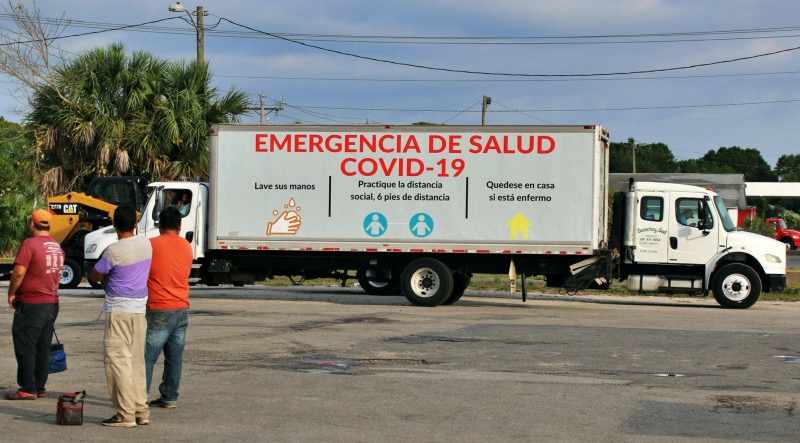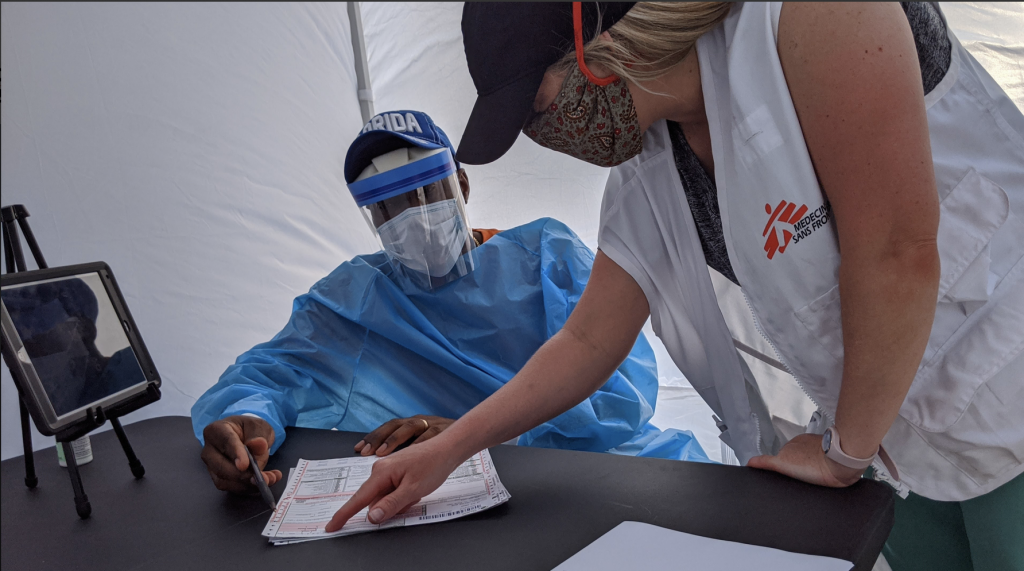
Doctors Without Borders to NPR: We need “more access to tests that we can use so the persons who are positive, their contacts could get tested, so we can quell this outbreak.”
After weeks of anxiety, it appears that the novel coronavirus has established a foothold in Immokalee.
Just last month, before state and local authorities agreed to implement three days of mass COVID-19 testing in Immokalee, the number of positive tests reported in the farmworker town hovered for several weeks in the 20-30s, creating the impression of a vulnerable community miraculously spared by the deadly virus. Then, last week, following the three days of testing — and more than a week of delay before the lab finally released the results — the number jumped to nearly 100.
And now today, just two weeks after completion of the mass testing, the number of cases has risen to 249, with stories of severe cases beginning to circulate in the tight-knit farmworker community and new cases increasing by larger and larger numbers every day. As a result, Immokalee has shot up the list of cities with the most cases in the state of Florida, landing among much larger cities like Gainesville, home of the University of Florida, and towns on the east coast of Florida, where large numbers first appeared in the early days of the outbreak:

The days of thinking Immokalee had dodged the COVID-19 bullet are now behind us. And Doctors Without Borders, the Nobel Prize-winning health care organization that set up shop in Immokalee several weeks ago to do battle with the virus, is turning to the press to amplify its call for testing resources to quell the increasingly alarming outbreak.
Yesterday, Doctors Without Borders issued a press release about its work in Immokalee in partnership with the CIW and a broad collaboration of local health agencies and community organizations. Here’s an excerpt from that release:
IMMOKALEE, FLORIDA, MAY 18, 2020—The international medical humanitarian organization Doctors Without Borders/Médecins Sans Frontières (MSF) has begun working in Southwest Florida to assist migrant farmworkers who are particularly susceptible to contracting COVID-19.
The organization is working in Immokalee, Florida, on a public health education campaign and is supplementing local testing efforts. It is also providing non-COVID-19 medical consultations through community-based mobile “virtual” medical clinics.
“Immokalee is a community where as many as 15,000 to 20,000 migrant farmworkers continue to provide essential labor during this pandemic despite having a high risk of contracting COVID-19 due to crowded living conditions and limited ability to prevent infection during the course of their work,” said Adi Nadimpalli, a doctor working as MSF project coordinator in Florida.
MSF is working in close collaboration with local partners, including the Coalition of Immokalee Workers (CIW), the Healthcare Network of Southwest Florida, the Braden Clinic, and the Department of Health of Immokalee and Collier County. Over the last three weeks, MSF has conducted public health activities in Spanish, Haitian Creole, and English to promote healthy behavior and social distancing. The organization has also run five mobile clinics where it has tested 126 people, with significant support from the Healthcare Network of Southwest Florida. While the majority of the test results are still pending, initial results from the first clinics show a high positivity rate, indicating ongoing community transmission.
Dr. Nadimpalli also noted that these initial clinics have shown that there is a strong interest from community members for testing. Last Wednesday alone, 47 patients came to the MSF clinic for COVID-19 testing, many of whom had symptoms or were contacts of patients who tested positive during mass testing done the week before by the Department of Health and the National Guard.
While there is a desire for testing by the community, accessing tests and the personal protective equipment (PPE) required to operate clinics is challenging, not just for MSF, but also for other organizations in the area as well, said Dr. Nadimpalli.
“While confirming more positive cases might sound alarming, the fact is persistent testing and ongoing health education is the only way to break the chains of transmission and stop this outbreak,” said Dr. Nadimpalli. “Testing should be accessible to every person at a convenient time and place, in their native language, and in a safe environment.”…
… MSF first learned of the concerning situation in Immokalee after being contacted by CIW, a human rights organization with a long history working in the community. Since the start of the outbreak, CIW has called for specific public health interventions and policies to control the outbreak and reduce community transmission, such as increased access to free COVID-19 testing, affordable health care, and isolation facilities.
At the end of April, MSF sent a team to Immokalee to assess the situation and quickly realized that health education and testing activities needed to be ramped up immediately.
“We wanted to ensure that these workers received COVID-19 health education and testing before they started to migrate north at the end of the southern Florida farming season,” said Dr. Nadimpalli. “If we don’t reach them now, it may be much more difficult to ensure their safety. However, we’ve never worked in Florida and could not have responded in time without the support of CIW and our other local health services partners.”
MSF says it is concerned that the current testing efforts, including its own clinics, are insufficient.
“Testing has increased in bigger cities, but we’re going to have to ramp up testing right here in Immokalee in order to control the spread of the virus and meet the needs of the community,” said Dr. Nadimpalli.
Dr. Nadimpalli also spoke with the local NPR affiliate, WGCU, this week about his concerns:
During a Collier County COVID-19 response call, Dr. Adi Nadimpalli, who is leading the local team, said they’re supporting prevention awareness, while working with Healthcare Network of Southwest Florida at mobile clinics, and beginning to help with contract tracing. He said they’re also ready to help expand testing efforts, but need test kits.
“One of the things that would be helpful is if there’s more access to tests that we can use so the persons who are positive, their contacts could get tested, so we can quell this outbreak.”
Dr. Nadimpalli said they’re ready to offer testing on evenings and weekends.
Immokalee Division Director for Department of Health Collier, Mark Lemke, said he is working with the department of health to try to get more test kits.
“So we will do our best to see if we can get some supplies so that you can be out there in the community and on the weekends.”
As the numbers continue to climb in Immokalee, the immediate next steps – if we have any hope of combating the rising tide of the coronavirus among the men and women who put food on the nation’s plate here in Immokalee – are clear: We need not only additional, consistent, and accessible testing, but also effective contact tracing and wrap-around services to support the hundreds of COVID-positive patients in Immokalee.
Make sure to stay tuned in the weeks ahead for how you can support the ongoing efforts in Immokalee!

